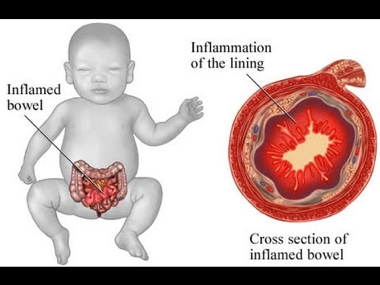Gastro-Intestinal Problems
Gastrointestinal problems relate to the gastrointestinal tract – the esophagus, stomach, small intestine, large intestine and rectum, and the accessory organs of digestion
Necrotising Enterocolitis
Necrotising enterocolitis (NEC) is a serious illness where tissue in the bowel becomes inflamed. The exact cause of NEC is unknown, but it is thought that a weakness in the intestines is responsible as a result of a lack of oxygen during a difficult delivery. NEC usually causes a temporary intolerance of milk feeds, but when severe enough it can result in some parts of the bowel becoming so damaged that tissue within it dies. This can cause a hole to develop which can lead to a serious infection as the contents of the intestine leak into the abdomen. NEC may affect just a small part of the bowel or, on occasions, the whole bowel may be affected.

NEC varies in severity and is generally associated with preterm babies, but has been seen in term babies. It can be difficult to diagnose as symptoms are similar to other conditions’ symptoms. Symptoms include a mild to severely swollen abdomen with possible other issues such as discolouration, vomiting, diarrhoea, poor feeding, lethargy, periods of apnoea/disrupted breathing, and fever. Suspected NEC is always treated as a medical emergency followed with extreme caution.
In the case of ‘suspicion’ that your baby may have NEC, oral feeds are stopped and your baby will receive intravenous fluids and antibiotics. This allows the bowel to rest whilst further investigations are being carried out to diagnose the condition. Once your baby’s doctor deems it appropriate, oral feeds will be slowing reintroduced. If your baby has developed a perforation in their intestine or has not responded to antibiotic treatment then surgery will be required. It will be carried out under general anesthetic, and the surgeon will remove any part(s) of the intestine where the tissue has died. Your baby will be fed intravenously as they recover from the surgery.
An exclusive human milk diet reduces the risk of necrotising enterocolitis.

